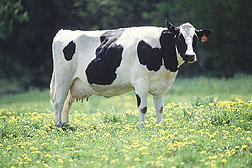This page has been archived and is being provided for reference purposes only. The page is no longer being updated, and therefore, links on the page may be invalid.
Perchlorate in Milk Examined
By Kim KaplanOctober 31, 2005
A dairy cow's rumen can act as a biological filter, breaking down most perchlorate in feed, according to an Agricultural Research Service (ARS) study published this week in the Proceedings of the National Academy of Science.
The research was done by animal physiologist Anthony V. Capuco and a team of scientists from the ARS Bovine Functional Genomics Laboratory, and by chemist Clifford Rice and a team from the ARS Environmental Quality Laboratory. Both labs are part of the ARS Henry A. Wallace Beltsville (Md.) Agricultural Research Center. The scientists found that up to 83 percent of perchlorate fed to cows is metabolized by the rumen.
Public concern about perchlorate, an industrially used oxidant as well as a naturally occurring compound, has increased in recent years, especially after very low levels of perchlorate were found in milk.
Capuco and his colleagues found that while perchlorate levels in the milk of cows fed various levels of perchlorate did increase slightly as consumption increased, the levels did not rise in direct proportion to the increased consumption. Similar trends were noted in urine, feces and blood.
Previous work had shown that perchlorate did not accumulate in the cows' tissues, and the researchers found no deleterious health effects in the cows, even at the highest level of perchlorate fed--40 mg/day--in the study. No changes were found in the cows' blood chemistry, blood differential counts, incidence of mastitis, body temperature or thyroid hormone concentrations, or in indirect measures of health such as feed intake and milk production.
This study helps assess environmental influences on milk perchlorate levels and provides a context for assessing the potential for impact on human health.
ARS is the U.S. Department of Agriculture's chief in-house scientific research agency.

